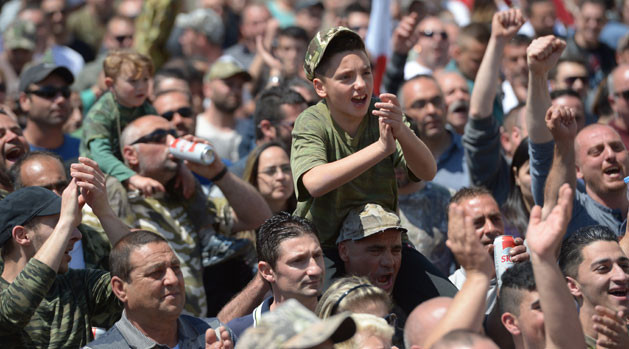Bird hunters celebrate as Malta rejects hunting ban
Spring hunting season set to begin after a closely contested referendum pitted conservation against tradition

A free daily email with the biggest news stories of the day – and the best features from TheWeek.com
You are now subscribed
Your newsletter sign-up was successful
The spring hunting of quail and turtle doves is to continue in Malta after hunters celebrated a narrow victory in a referendum which could have banned the controversial practice.
Just 50.44 per cent of Maltese voted in favour of allowing hunters to continue to kill the birds during the spring hunting season, which begins this week and runs to the end of April.
The head of the country’s hunting association said he was "ecstatic" that a ban had been rejected, the BBC reported. Joe Perici Calascione of the Federation for Hunting and Conservation said that spring hunting was an "integral part" of Maltese tradition.
The Week
Escape your echo chamber. Get the facts behind the news, plus analysis from multiple perspectives.

Sign up for The Week's Free Newsletters
From our morning news briefing to a weekly Good News Newsletter, get the best of The Week delivered directly to your inbox.
From our morning news briefing to a weekly Good News Newsletter, get the best of The Week delivered directly to your inbox.
Malta is the only country in the EU that allows the recreational spring hunting of the two species, under strict regulations. There are 10,000 licenced hunters who are legally required to declare every time they go hunting and make a kill.
"We're the most regulated country in Europe with regards to hunting," said Calascione. "The hunting we do is sustainable."
Responding to critics who argue that the practice is cruel, one hunter told the BBC: "I'm sure [those people] eat chicken, they eat rabbits. You have to kill to eat. What we hunt, we eat. We don't throw it away."
Birdlife Malta, which led the campaign to ban the practice, said it was “devastated” to lose by such a narrow margin. Conservationists want it banned because it takes place during a crucial migration season.
A free daily email with the biggest news stories of the day – and the best features from TheWeek.com
They argue the practice must be banned in spring, as hunters are killing birds that have survived the winter and are returning to Europe to breed. The turtle dove population is especially threatened, whose numbers have fallen almost 80 per cent since 1980.
"This isn't just a Maltese problem. These birds are moving between Africa and mainland Europe – it's an African-European issue," BirdLife Malta executive director Steve Micklewright told Deutsche Welle.
Campaigners also argue that hunters dominate the restricted amount of open space on the island. "We never manage to walk freely and use what's left of our countryside,” said the campaign’s spokeswoman Moira Delia. “We come across these vulgar and very intimidating men, armed, who shout at us and send us home."
-
 Palantir's growing influence in the British state
Palantir's growing influence in the British stateThe Explainer Despite winning a £240m MoD contract, the tech company’s links to Peter Mandelson and the UK’s over-reliance on US tech have caused widespread concern
-
 Quiz of The Week: 7 – 13 February
Quiz of The Week: 7 – 13 FebruaryQuiz Have you been paying attention to The Week’s news?
-
 Nordic combined: the Winter Olympics sport that bars women
Nordic combined: the Winter Olympics sport that bars womenIn The Spotlight Female athletes excluded from participation in demanding double-discipline events at Milano-Cortina
-
 Epstein files topple law CEO, roil UK government
Epstein files topple law CEO, roil UK governmentSpeed Read Peter Mandelson, Britain’s former ambassador to the US, is caught up in the scandal
-
 Iran and US prepare to meet after skirmishes
Iran and US prepare to meet after skirmishesSpeed Read The incident comes amid heightened tensions in the Middle East
-
 Israel retrieves final hostage’s body from Gaza
Israel retrieves final hostage’s body from GazaSpeed Read The 24-year-old police officer was killed during the initial Hamas attack
-
 China’s Xi targets top general in growing purge
China’s Xi targets top general in growing purgeSpeed Read Zhang Youxia is being investigated over ‘grave violations’ of the law
-
 Panama and Canada are negotiating over a crucial copper mine
Panama and Canada are negotiating over a crucial copper mineIn the Spotlight Panama is set to make a final decision on the mine this summer
-
 Why Greenland’s natural resources are nearly impossible to mine
Why Greenland’s natural resources are nearly impossible to mineThe Explainer The country’s natural landscape makes the task extremely difficult
-
 Iran cuts internet as protests escalate
Iran cuts internet as protests escalateSpeed Reada Government buildings across the country have been set on fire
-
 US nabs ‘shadow’ tanker claimed by Russia
US nabs ‘shadow’ tanker claimed by RussiaSpeed Read The ship was one of two vessels seized by the US military